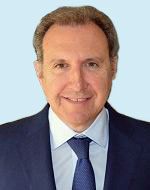
Steven Rudofsky
Founder, Talex Commodities Capital
Steven has been working in upstream and midstream natural resources for 30 years. He began his career at Glencore (then Marc Rich and Co) in 1988 in Zug and focused on the emerging markets of the former Soviet Union, Africa and Latin America. Working in conjunction with Western European banks, Steven developed innovative financial solutions that allowed Glencore and others to secure off-take contracts and to deliver raw materials into emerging markets at a substantial premium.
After Glencore, Steven held senior and CEO positions at TransCanada Pipeline Ltd, Credit Agricole Investment Bank and Alfa Group of Russia. In the 1990s and 2000s, as logistics and facilitation became increasingly important, Steven worked closely with local and national governments to upgrade pipelines, ports, terminals and local warehousing in emerging markets. After the financial crisis in 2008, Western European banks increasingly withdrew from the natural resource sectors as they no longer had the balance sheets to execute and syndicate commodity deals. Steven soon thereafter formed Talex Commodities to provide solutions to address the decline in bank funding, working with private equity and debt providers, including family offices, to implement innovative capital structures such as streaming, convertible debt and royalties, into the junior mining and oil & gas sectors. In sum, with 30 years of experience in physical commodities and finance, Steven is one of the few professionals working within the industry that has the background of structuring and executing deals on the ground, not simply sitting behind a desk in New York, London or Toronto. He has a BA in History and a JD in Law and is a member of the New York Bar.
Money and Mines in 2019: The Guide to the Perplexed.
Current Situation in Junior Mining in emerging markets
a. Equity is mostly raised on TSX/AIM/ASX
i. These markets are very quiet- and it is almost impossible to raise equity capital that is not highly dilutive
ii. There is little or no trading volume- so no price discovery and little interest from sophisticated investors
iii. With some exceptions- only producing or near producing assets are attracting finance
iv. Poor and variable quality of management teams is a problem
v. Battery metals has been an interesting story- but difficult to raise money for anything but producing assets.
vi. Occasionally a trading company or fund will provide equity to facilitate the debt component.
b. Credit
i. Most attractive and cheapest credit is for precious and base metals/minerals
ii. Concentrates are more interesting than metal- as traders can blend for their customers
iii. Battery metals such as lithium, cobalt, molybdenum etc are probably over-priced and there is a limited appetite.
iv. Whilst it is possible to finance other minerals such as steel making raw materials- the business case will have to be compelling with either 25% plus return with near cash flow or material equity kickers.
v. Pricing of credit will be driven by jurisdiction, time to productions and commodity. Whilst not dilutive in the classic sense- gold loans, royalties and streaming will materially impact cash flow to the company and diminish company valuations.
c. Solutions for companies short term
i. Improve management teams- and focus on narrative of mitigation of risk and realistic business models.
ii. Do not produce decks with lots of maps and information that “smart investors” are not interested in.
iii. Cash flow model in excel based on mine plans with conservative assumptions both on recoveries and pricing.
iv. Whilst it is often possible to raise equity at project level- it might be in the context of a streaming or royalty deal where there is currently more capacity.
d. Longer term solutions
i. It might be more advantageous to wait until markets improve if you can wait until the sector as a whole improves.
ii. Chinese SOEs and private companies are increasingly not interested in any assets that are not tier one. Therefore- solutions will remain in accessing capital in places like New York, Toronto, London and Zurich. Focus on relationships that will realistically yield results and don’t waste time in China unless you meet their approximate criteria. Exceptions will be Chinese owned companies like IXM.
iii. CEE countries are well placed for western investment provided they can demonstrate good management. Companies that are involved in murky practices that are questionable will be problematic for investors given increasing transparency of the capital markets and regulatory bodies such as the FCA, FINRA and IROC. Companies looking to access smart and passive money will have to focus more on corporate governance.
iv. Green field and earlier stage exploration is out of favour. It might be a good time to find and secure those assets at knock down prices with the expectation that markets will improve in the coming years.
